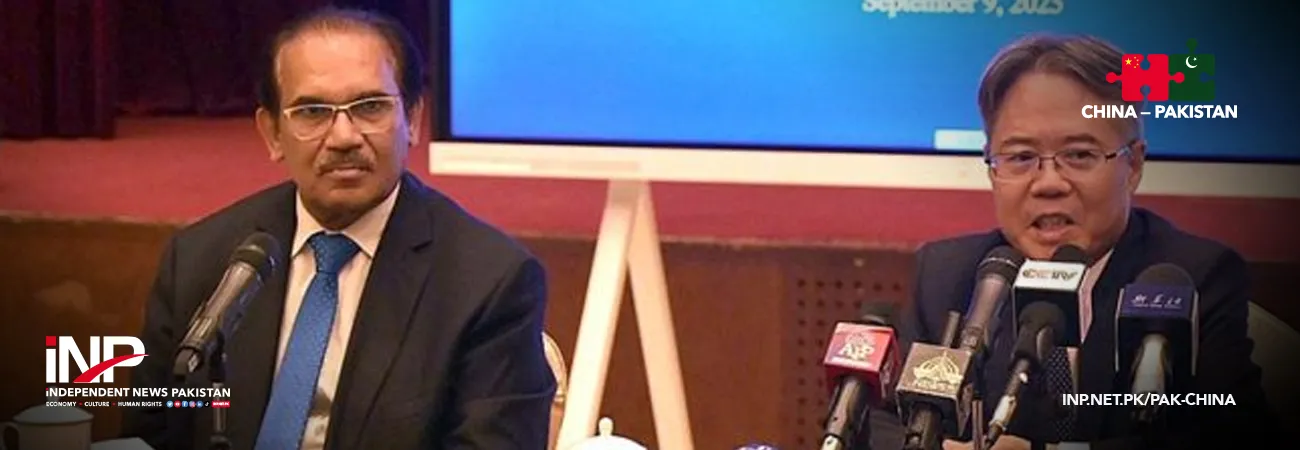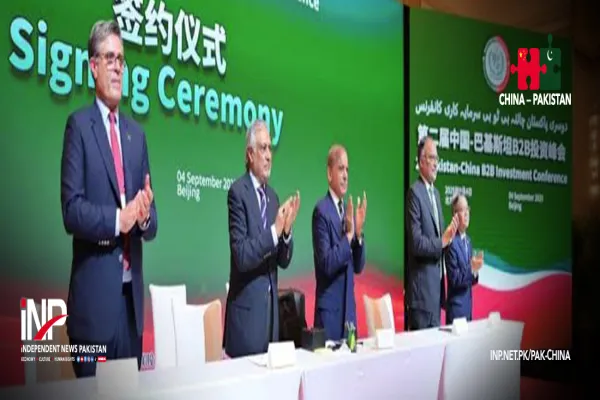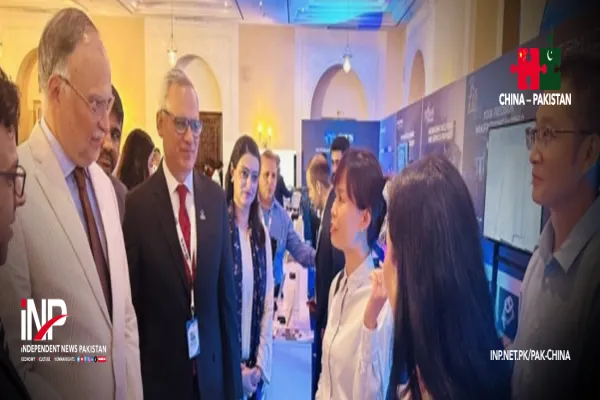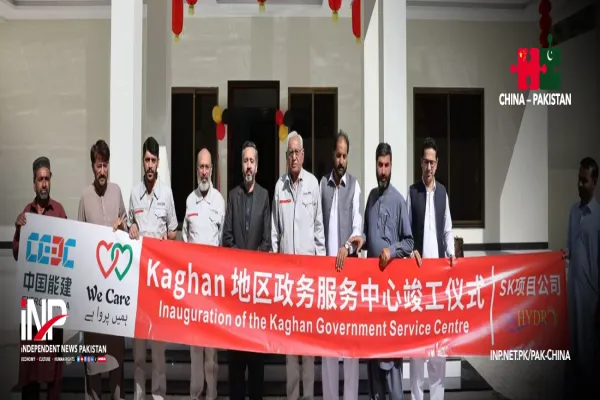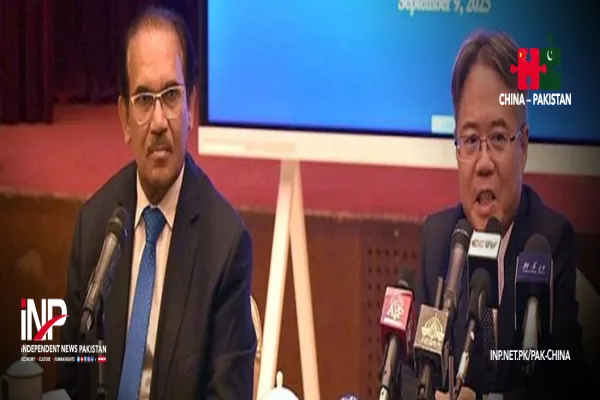i NEWS PAK-CHINA
China will work with Pakistan to accelerate the implementation of the outcomes of the Tianjin Summit, carry forward the Shanghai Spirit and pool the strength of the SCO with concrete actions. This aims at building a closer SCO community with a shared future and make new contributions to the development and growth of the Global South and the prosperity and development of regional countries. This was stated by Ambassador Jiang Zaidong at a media interaction held here at Chinese Embassy.
China believes that Pakistan played an active and positive in the successful conducting of recently held SCO’s Summit and achieving its objectives. He said, Prime Minister Shahbaz Sharif attended all the activities of the Summit and made solid contribution developing the SCO as a strong platform as well as giving boost to Sino-Pak bilateral ties. Ambassador Jiang Zaidong took relevant questions about the SCO, including the President Xi Jinping Global Governance Initiative. He
To a question, he said, "Chinese President Xi Jinping while addressing SCO Plus" Meeting in Tianjin had proposed the Global Governance Initiative (GGI), calling on countries to work in concert for a more just and equitable global governance system. The GGI marks the fourth landmark global initiative proposed by Xi over the past several years, following the Global Development Initiative, the Global Security Initiative and the Global Civilization Initiative.
Xi highlighted five principles of the GGI -- adhering to sovereign equality, abiding by international rule of law, practicing multilateralism, advocating the people-centered approach, and focusing on taking real actions." The ambassador also talked about the grand military parade held in Beijing on September 3 commemorating the 80th anniversary of the victory of the Chinese People’s War of Resistance Against Japanese Aggression and the World Anti-Fascist War. The purpose of the parade was to remember history, honor fallen heroes, cherish peace, and create a better future
This marked the complete victory of the World Anti-Fascist War. It was a historic turning point for the Chinese nation emerging from the grave crises in modern times to embark on the journey toward great rejuvenation; it was also a major turning point in the course of world history. On the occasion, Counselor Wang Shengjie gave a briefing about PM Shehbaz Sharif's visit to China, SCO Tijian Summit and the commemoration of the 80th anniversary of the victory of the Chinese People’s War of Resistance Against Japanese Aggression and the World Anti-Fascist War.
PM's Special Representative on China Zafar Uddin Mahmood shared his personal comments on the summit and the PM’s visit." Replying to questions, the Ambassador further said, "This was the fifth time that China had hosted the SCO summit. It brought the “China Year” of the SCO since China assumed the presidency in July last year to a grand finale. It was a gathering of unity, friendship and fruitful outcomes, with distinctive features and many highlights. Personally I’d like to share following three aspects:
First, old and new friends gathered in Tianjin. More than 20 foreign heads of state and government and 10 heads of international organizations attended the summit. President Xi Jinping intensively attended nearly 20 bilateral and multilateral events, honoring friendship and planning development with other leaders, building consensus and stimulating momentum for cooperation, and pushing the SCO into a new stage of high-quality development featuring greater unity, more emphasis on collaboration, more vitality and more achievements. Second, the outcomes of cooperation cover many areas.
A 10-year development strategy was formulated, the outcomes of the victory in World War II were upheld, the multilateral trading system was supported, four security centers were established, a decision was made to set up an SCO development bank, six platforms for practical cooperation were launched, and six action plans for high-quality development were drawn up.
Third, China has made outstanding contributions once again. President Xi Jinping announced that China plans to implement 100 “small and beautiful” livelihood projects in member states in need, provide 2 billion yuan in aid to member states within this year, issue an additional 10 billion yuan of loans to member banks of the Interbank Consortium of the SCO in the next three years, and provide 10,000 training opportunities in the next five years.
These practical measures fully demonstrate China’s responsibility and commitment to promoting global development, exchange among civilizations and human progress. As important members of the SCO, China and Pakistan have always maintained close coordination and cooperation within the framework of the organization.
This year on the occasion of the Tianjin Summit, President Zardari published an article on China Daily, speaking highly of the SCO that “has now become a strong and tall tree” and sincerely wishing the summit a complete success under the leadership of President Xi Jinping. Prime Minister Shehbaz Sharif attended the entire meeting, praising the SCO as the platform that best reflects Pakistan’s firm commitment to regional cooperation and integration.
He stressed that China’s successful presidency of the SCO reflects the wise and visionary leadership of President Xi Jinping, and said that Pakistan will always stand side by side with China in the pursuit of peace, progress and prosperity. President Xi Jinping proposed the Global Governance Initiative at the “SCO Plus” meeting. It is another important public good provided by China to the international community, following the Global Development Initiative, the Global Security Initiative, and the Global Civilization Initiative.
It injects strong momentum into building a more just and reasonable global governance system and jointly moving toward a community with a shared future for humanity, fully demonstrating the broad global vision and strong sense of responsibility of President Xi Jinping in seeking progress for humanity and common good for the world.
As we all know, this year marks the 80th anniversary of the victory of the World Anti-Fascist War and the founding of the United Nations. Eighty years ago, the catastrophe of the two world wars prompted the international community to learn from the pain, leading to the establishment of the United Nations and opening a new chapter in global governance.
Eighty years later, the trend of the times toward peace, development, cooperation, and win-win outcomes remains unchanged. However, the shadows of Cold War mentality, hegemonism, unilateralism, and protectionism persist, regional conflicts occur one after another, global challenges are increasing, and the world has entered a new period of turbulence and transformation. Therefore, UN Secretary-General António Guterres called for “urgent reforms to the international governance architecture,” reflecting the widespread consensus and eager expectations of countries.
At this critical historical juncture, President Xi Jinping, with a focus on the future and destiny of humanity and in compliance with the trend of the times, proposed China’s initiatives for reforming and improving global governance, which are: adhering to sovereign equality, abiding by international rule of law, practicing multilateralism, advocating people-centered approach, and focusing on taking real actions.
These are the core concepts of the Global Governance Initiative and are in line with the purposes and principles of the UN Charter. Among them, sovereign equality is the primary prerequisite, requiring the promotion of democratization of international relations and enhancing the representation and voice of developing countries; international rule of law is the fundamental guarantee, requiring full and complete compliance with the basic norms of international relations and ensuring the equal and uniform application of international law and rules; multilateralism is the basic path, requiring adherence to the global governance concept of extensive consultation, joint contribution, and shared benefits, and giving full play to the irreplaceable role of the United Nations in global governance; people-centered approach is the value orientation, requiring that people of all countries jointly participate in global governance and share its outcomes; action-oriented approach is the important principle, requiring systematic planning and promotion, and coordinated global actions.
The Ambassador emphasize that reforming and improving global governance is a long-term task that requires visionary concepts for guidance and solid actions by all countries over time. He added," As important members of the Global South, China and Pakistan have always stood on the side of international fairness and justice and on the right side of history.
Pakistan has also always been at the forefront of supporting China’s major initiatives and concepts. Prime Minister Shehbaz Sharif immediately stated that the Global Governance Initiative proposed by President Xi Jinping is of great significance to world peace, development, and stability, and is a historic step toward stronger multilateralism, helping the global governance system better meet the needs of developing countries and address common challenges of humanity.
Pakistan fully supports it and will actively implement it. We highly appreciate this and look forward to working with Pakistan to continue to deepen and implement the four global initiatives, including the Global Governance Initiative, jointly practice true multilateralism, promote equal and orderly world multipolarity and inclusive and universally-beneficial economic globalization, and make unremitting efforts to build a community with a shared future for humanity."
About the spectacular Military Parade held on September 3, the Ambassador said, " Prime Minister Shehbaz Sharif, and he was honored to see it. New equipment and new capabilities were on display. He was deeply impressed by China’s firm resolve to stay on the path of peaceful development, strong will to defend national sovereignty and territorial integrity, and great capability for safeguarding world peace and tranquility. President Xi stressed on the occasion that the grand commemoration of the 80th anniversary of the victory of the Chinese People’s War of Resistance Against Japanese Aggression and the World Anti-Fascist War is held to remember history, honor fallen heroes, cherish peace, and create a better future.
The Chinese nation is a great nation that is never intimidated by any bullies and always values independence and forges ahead. The Chinese People’s Liberation Army has been, and will always be, the heroic armed forces that the Party and the people can fully trust and rely on. China will stay firmly on the path of socialism with Chinese characteristics, and carry forward the great spirit of the War of Resistance. China will press ahead with enterprise and resolve.
The great rejuvenation of the Chinese nation is irresistible! The noble cause of peace and development of humanity will prevail! This, I believe, is the solemn proclamation and clear message sent by China. At present, we are attentively learning and thoroughly implementing the important speech of President Xi Jinping. China always believe that history must never be forgotten. September 3rd marks the victory of the Chinese People’s War of Resistance Against Japanese Aggression and the victory of the World Anti-Fascist War.
For this day, the Chinese people made an enormous national sacrifice with more than 35 million casualties, making a major contribution to saving human civilization and defending world peace and winning sincere respect from peace-loving people across the world. For this day, the Chinese people fought an indomitable struggle for 14 years, completely defeated the brutal Japanese militarist aggressors, and achieved a historic transition of the Chinese nation from a profound crisis since modern times to great rejuvenation.
For this day, the Communist Party of China fought bravely at the forefront of the War of Resistance, propping up the hope of the Chinese nation for survival and standing firm as the mainstay in the whole nation’s War of Resistance.
We remember this part of history to remind ourselves that the only way to stop an aggressors is to speak in the language they can only understand and win the war, and win peace and respect with victory.
We remember this part of history to show the world that the Chinese people will not provoke trouble, but we never flinch when trouble comes our way; that the Chinese nation cannot be intimidated or crushed; and that no country or force should ever entertain the thought of stopping the marching steps of the great rejuvenation of the Chinese nation.
Needless to say, we remember history not to perpetuate hatred, but to better uphold peace and open up the future.
The most valuable lesson left by the victory of the Chinese People’s War of Resistance Against Japanese Aggression and the World Anti-Fascist War is that we must unswervingly follow the path of peaceful development, and peace needs to be upheld by all countries. In World War II, more than 100 million military personnel and civilians were killed or injured.
The lesson learned in blood tells us that the law of the jungle and the strong preying on the weak are not the way for humanity to coexist; militarism and hegemony are not the way to bring peace to humanity; and the winner-takes-all and zero-sum game are not the path to development for humanity.
Unfortunately, even today, some forces in Japan are still trying to whitewash the history of aggression and war, and Japanese militarism is still haunting. We can see with our own eyes that certain countries are still seeking hegemony and imposing suppression and sanctions on other countries at every turn. They wield the stick of tariffs and recklessly reap profits from the whole world. They have become a source of chaos in the international situation and a threat to world peace and development. Eighty years ago, in the face of brutal fascist forces, people across the world stood up to the brutal force and fought in unity, and achieved great victory in the end.
Today, eighty years later, all forces that stand for justice and against hegemony need to come together in tight unity again, firmly oppose hegemonic, bullying and high-handed practices, and strive for a brighter future for humanity. Chinese modernization is the modernization of peaceful development. China will always be a force for peace, stability and progress in the world.
Both China and Pakistan suffered from the aggression of imperialism and colonialism, and both look forward to world peace and happiness of the people. We stand ready to work with Pakistan to uphold international fairness and justice and promote the lofty cause of peace and progress for humanity."
Credit: Independent News Pakistan (INP) — Pak-China


